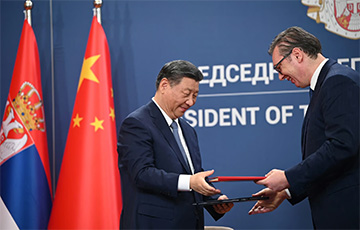Politico: Serbia Traded Russia For China
4- 9.05.2024, 5:13
- 6,210

Belgrade is more likely to “play the Chinese card” as it is considered less provocative.
The visit of Chinese leader Xi Jinping to Belgrade as part of a European tour sparked unprecedented enthusiasm in Serbia, a country often considered one of China's most loyal allies in Europe.
"I told him that as the leader of a great state, he would be welcomed with respect all over the world, but such respect and love that he would meet in our Serbia, he would not find anywhere else," President Aleksandar Vučić said after the meeting ceremony, Politico reports.
Serbia stands out as the country that was the first to accept Chinese investments in Europe – large-scale infrastructure projects, such as the construction of highways, a metallurgical plant and a mining basin. However, this expansion has come at a cost to Serbia, which has accumulated a debt burden of about 3.7 billion euros due to the widespread practice of pooling Chinese investments in credit schemes.
Serbia is also the only European country to have acquired China's HQ-22 – Hong Qi Air Defence Systems, a surprise given the difficulty of integrating them into European weapons systems.
Xi's arrival was met with strict security measures that effectively halted the Serbian capital: more than 6,500 police officers were stationed at key points along the route of the visit, giving the Chinese ruler greatness, which is in line with his goal to strengthen the country's importance in the West.
Serbia, known for its close ties to Russia and frequent criticism of Brussels' policies, is proving to be a useful tool in this endeavor, despite its modest size and economic clout.
“This visit shows that Serbia traded Russia for China when it came to its main partner to bargain with the West. The full-scale invasion of Ukraine has put Serbian-Russian relations under close scrutiny, so the government sees the benefit of playing the Chinese card more often, as it is considered less provocative,” said Vuk Vuksanovic, an expert on Sino-Serbian relations and a senior fellow at the Belgrade Center for Preservation Policy.
According to him, the Balkans, and Serbia in particular, have become even more interesting for China now, when one of the Belt and Road Initiative through Russia and Belarus was actually cut off by a full-scale invasion of Ukraine.
Recall that on May 8, China and Serbia agreed on a "common future" during Xi Jinping's visit to this Balkan country. The two countries have signed 29 agreements promoting legal, regulatory and economic cooperation.










